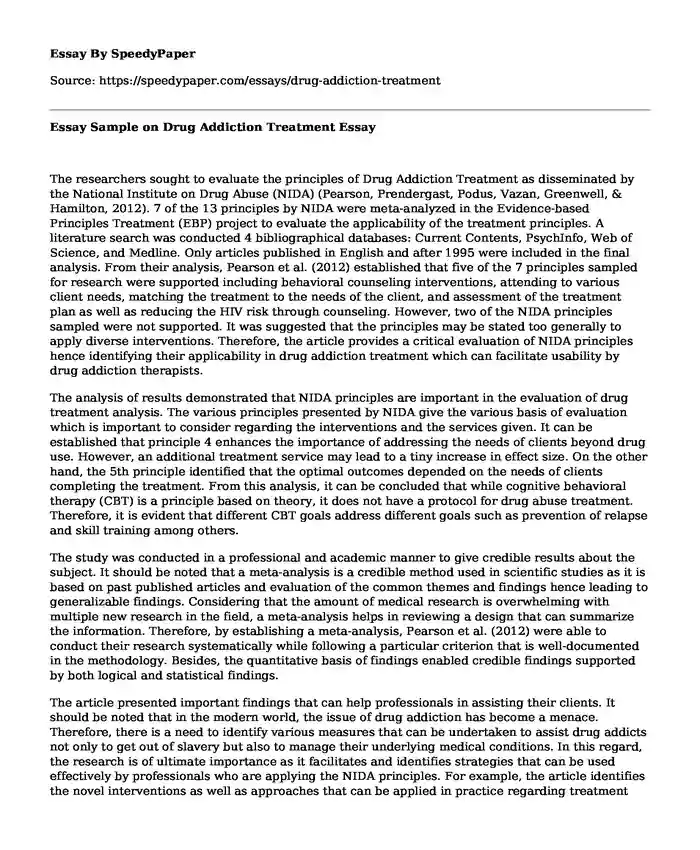
| Type of paper: | Article review |
| Categories: | Medicine Healthcare Substance abuse Drug abuse |
| Pages: | 3 |
| Wordcount: | 644 words |
The researchers sought to evaluate the principles of Drug Addiction Treatment as disseminated by the National Institute on Drug Abuse (NIDA) (Pearson, Prendergast, Podus, Vazan, Greenwell, & Hamilton, 2012). 7 of the 13 principles by NIDA were meta-analyzed in the Evidence-based Principles Treatment (EBP) project to evaluate the applicability of the treatment principles. A literature search was conducted 4 bibliographical databases: Current Contents, PsychInfo, Web of Science, and Medline. Only articles published in English and after 1995 were included in the final analysis. From their analysis, Pearson et al. (2012) established that five of the 7 principles sampled for research were supported including behavioral counseling interventions, attending to various client needs, matching the treatment to the needs of the client, and assessment of the treatment plan as well as reducing the HIV risk through counseling. However, two of the NIDA principles sampled were not supported. It was suggested that the principles may be stated too generally to apply diverse interventions. Therefore, the article provides a critical evaluation of NIDA principles hence identifying their applicability in drug addiction treatment which can facilitate usability by drug addiction therapists.
The analysis of results demonstrated that NIDA principles are important in the evaluation of drug treatment analysis. The various principles presented by NIDA give the various basis of evaluation which is important to consider regarding the interventions and the services given. It can be established that principle 4 enhances the importance of addressing the needs of clients beyond drug use. However, an additional treatment service may lead to a tiny increase in effect size. On the other hand, the 5th principle identified that the optimal outcomes depended on the needs of clients completing the treatment. From this analysis, it can be concluded that while cognitive behavioral therapy (CBT) is a principle based on theory, it does not have a protocol for drug abuse treatment. Therefore, it is evident that different CBT goals address different goals such as prevention of relapse and skill training among others.
The study was conducted in a professional and academic manner to give credible results about the subject. It should be noted that a meta-analysis is a credible method used in scientific studies as it is based on past published articles and evaluation of the common themes and findings hence leading to generalizable findings. Considering that the amount of medical research is overwhelming with multiple new research in the field, a meta-analysis helps in reviewing a design that can summarize the information. Therefore, by establishing a meta-analysis, Pearson et al. (2012) were able to conduct their research systematically while following a particular criterion that is well-documented in the methodology. Besides, the quantitative basis of findings enabled credible findings supported by both logical and statistical findings.
The article presented important findings that can help professionals in assisting their clients. It should be noted that in the modern world, the issue of drug addiction has become a menace. Therefore, there is a need to identify various measures that can be undertaken to assist drug addicts not only to get out of slavery but also to manage their underlying medical conditions. In this regard, the research is of ultimate importance as it facilitates and identifies strategies that can be used effectively by professionals who are applying the NIDA principles. For example, the article identifies the novel interventions as well as approaches that can be applied in practice regarding treatment plans and clinical tools needed. Therefore, professionals in drug treatment can identify which principles to apply based on the situation they are dealing with. The research demonstrated that a meta-analysis is an effective approach that facilitates quantitative to qualitative assessment of the principles of an effective treatment which are vital in drug addiction treatment.
References
Pearson, F., Prendergast, M., Podus, D., Vazan, P., Greenwell, L., & Hamilton, Z. (2012). Meta-analyses of seven of NIDA's Principles of Drug Addiction Treatment. Journal of Substance Abuse Treatment, 43(1), 1-11. doi: 10.1016/j.jsat.2011.10.005
Cite this page
Essay Sample on Drug Addiction Treatment. (2023, Jan 25). Retrieved from https://speedypaper.com/essays/drug-addiction-treatment
Request Removal
If you are the original author of this essay and no longer wish to have it published on the SpeedyPaper website, please click below to request its removal:
- Essay Example about Synthesis of Anthraquinone
- Teaching Experience Description in Our Free Essay
- Free Essay Describing Iranian Revolution According to Michael Axworthy
- Essay Sample about Opting for Majors
- Subaru and Suzuki: SPPS Quantitative Assignment Essay Sample
- Free Essay Example: A Victim of Violence
- Essay Example: Post Implementation
Popular categories




